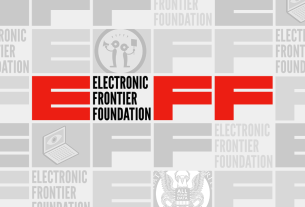Today is International Women’s Day, a day celebrating the achievements of women globally but also a day marking a call to action for accelerating equality and improving the lives of women the world over.
The internet is a vital tool for women everywhere—provided they have access and are able to use it freely. Here are four reasons why we’re working to protect the free and open internet for women and everyone.
1. The Fight For Reproductive Privacy and Information Access Is Not Over
Data privacy, free expression, and freedom from surveillance intersect with the broader fight for reproductive justice and safe access to abortion. Like so many other aspects of managing our healthcare, these issues are fundamentally tied to our digital lives. With the decision of Dobbs v. Jackson to overturn the protections that Roe v. Wade offered for people seeking abortion healthcare in the United States, what was benign data before is now potentially criminal evidence. This expanded threat to digital rights is especially dangerous for BIPOC, lower-income, immigrant, LGBTQ+ people and other traditionally marginalized communities, and the healthcare providers serving these communities. The repeal of Roe created a lot of new dangers for people seeking healthcare. EFF is working hard to protect your rights in two main areas: 1) your data privacy and security, and 2) your online right to free speech.
2. Governments Continue to Cut Internet Access to Quell Political Dissidence
The internet is an essential service that enables people to build and create communities, shed light on injustices, and acquire vital knowledge that might not otherwise be available. Governments are very aware of their power to cut off access to this crucial lifeline, and frequently undertake targeted initiatives to shut down civilian access to the internet. In Iran, people have suffered Internet and social media blackouts on and off for nearly two years, following an activist movement rising up after the death of Mahsa Amini, a woman murdered in police custody for refusing to wear a hijab. The movement gained global attention, and in response, the Iranian government rushed to control visibility on the injustice. Social media has been banned in Iran and intermittent shutdowns of the entire peoples’ access to the Internet has cost the country millions, all in effort to control the flow of information and quell political dissidence.
3. People Need to Know When They Are Being Stalked Through Tracking Tech
At EFF, we’ve been sounding the alarm about the way physical trackers like AirTags and Tiles can be slipped into a target’s bag or car, allowing stalkers and abusers unprecedented access to a person’s location without their knowledge. We’ve also been calling attention to stalkerware, commercially-available apps that are designed to be covertly installed on another person’s device for the purpose of monitoring their activity without their knowledge or consent. This is a huge threat to survivors of domestic abuse as stalkers can track their locations, as well as access a lot of sensitive information like all passwords and documents. For example, Imminent Monitor, once installed on a victim’s computer, could turn on their webcam and microphone, allow perpetrators to view their documents, photographs, and other files, and record all keystrokes entered. Everyone involved in these industries has the responsibility to create a safeguard for people.
4. LGBTQ+ Rights Online Are Being Attacked
An increase in anti-LGBTQ+ intolerance is harming individuals and communities both online and offline across the globe. Several countries are introducing explicitly anti-LGBTQ+ initiatives to restrict freedom of expression and privacy, which is in turn fuelling offline intolerance against LGBTQ+ people. Across the United States, a growing number of states prohibited transgender youths from obtaining gender-affirming health care, and some restricted access for transgender adults. That’s why we’ve worked to pass data sanctuary laws in pro-LGBTQ+ states to shield health records from disclosure to anti-LGBTQ+ states.
The problem is global. In Jordan, the new Cybercrime Law of 2023 in Jordan restricts encryption and anonymity in digital communications. And in Ghana, the country’s Parliament just voted to pass the country’s draconian Family Values Bill, which introduces prison sentences for those who partake in LGBTQ+ sexual acts, as well as those who promote the rights of gay, lesbian or other non-conventional sexual or gender identities. EFF is working to expose and resist laws like these, and we hope you’ll join us!
This blog is part of our International Women’s Day series. Read other articles about the fight for gender justice and equitable digital rights for all.


